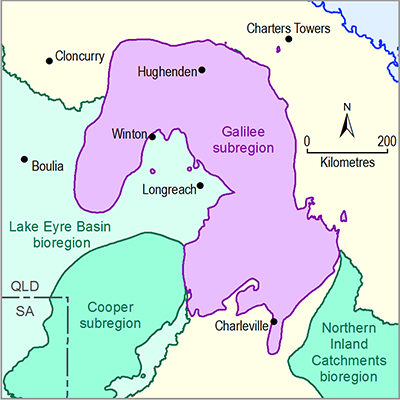- Home
- Assessments
- Bioregional Assessment Program
- Galilee subregion
- 1.2 Resource assessment for the Galilee subregion
Executive summary

The coal and coal seam gas resource assessment for the Galilee subregion summarises the known coal and coal seam gas resources and developments as at October 2014.
The information found in this product is used to develop the coal resource development pathway for the subregion.
Coal and coal seam gas resources
Significant deposits of black coal have been identified in the geological Galilee Basin. However as at October 2014 no commercial mines have been established due to the basin’s relative remoteness and lack of mine-enabling infrastructure.
The Galilee Basin is also recognised as an emerging coal seam gas resource.
Current activity and tenements
Since the mid-2000s a widespread exploration boom has occurred and there are six mining ventures proposed for development by 2020. These large-scale open-cut and underground mining operations propose to target the extensive side-branching coal seams of the Betts Creek beds.
In August 2014 approximately 33% of the Galilee subregion was covered by exploration permits for coal, with 154 granted and eight applications either wholly or partially located within the boundaries of the Galilee subregion. There are 14 coal mining lease applications for proposed coal mining activities in the Galilee subregion and six mineral development licences for coal projects. There are a further three under application.
Over 54% of the Galilee subregion is covered by exploration permits for petroleum, most of which have been awarded for coal seam gas exploration.
Proposals and exploration
As at August 2014 six development proposals were well advanced along a 200 kilometre north-trending corridor close to the eastern margin of the Galilee subregion. At full production, each project expects to extract between 15 and 60 million tonnes of raw coal per year.
Four proposals received conditional approval to proceed to the construction phase following Queensland and Australian Government assessment of environmental impact statements. The Carmichael development in the north-east of the basin has the potential to become Australia’s largest coal mine when fully operational.
The development of a coal seam gas production industry in the Galilee subregion is significantly less advanced than it is for coal. Early indications are that coal seam gas production is technically feasible in the subregion, however as at October 2014 its economic feasibility had yet to be determined.

- 1.2.1 Available coal and coal seam gas resources
- 1.2.2 Current activity and tenements
- 1.2.3 Proposals and exploration
- 1.2.3.1 Coal
- 1.2.3.1.1 Alpha Coal Project
- 1.2.3.1.2 Kevin's Corner Coal Project
- 1.2.3.1.3 China First Coal Project
- 1.2.3.1.4 Carmichael Coal Mine and Rail Project
- 1.2.3.1.5 South Galilee Coal Project
- 1.2.3.1.6 China Stone Coal Project
- 1.2.3.1.7 Alpha North Coal Project
- 1.2.3.1.8 Clyde Park Coal Project
- 1.2.3.1.9 Alpha West Coal Project
- 1.2.3.1.10 Carmichael East Coal Project
- 1.2.3.1.11 West Pentland Coal Project
- 1.2.3.1.12 Pentland Coal Project
- 1.2.3.1.13 Degulla Coal Project
- 1.2.3.1.14 Hyde Park Coal Project
- 1.2.3.1.15 Blackall Coal Project
- 1.2.3.1.16 Regional coal exploration in Galilee Basin
- 1.2.3.1.17 Galilee Basin State Development Area
- 1.2.3.2 Coal seam gas
- References
- 1.2.3.1 Coal
- 1.2.4 Catalogue of potential resource developments
- Appendix A
- Citation
- Acknowledgements
- Contributors to the Technical Programme
- About this technical product
